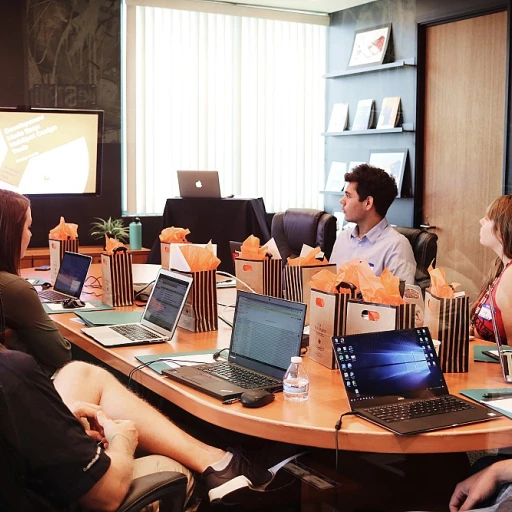
Understanding Power Structures in Arabian Emirate Companies
Unveiling the Power Structures
In the Arabian Emirate companies, understanding the intricate power structures is essential for effective project management. These structures are often influenced by cultural norms, organizational hierarchies, and individual leadership styles. Power dynamics can significantly impact how projects are managed and how teams collaborate to achieve their goals.
Power in these companies is not just about hierarchy; it's about influence and leadership. Managers and team leaders often leverage different types of power to guide their teams. This includes positional power, where authority is derived from one's position in the organization, and personal power, which stems from individual skills and expertise.
Key Elements of Power Dynamics
- Legitimate Power: This is the formal authority granted to managers and leaders, allowing them to make decisions and direct team efforts.
- Expert Power: Often seen in project managers with specialized knowledge or skills, this type of power is crucial for guiding technical teams.
- Referent Power: Derived from personal traits and relationships, this power enables leaders to inspire and motivate team members.
- Reward Power: The ability to provide incentives or rewards to team members for achieving project milestones.
For office managers in the UAE, cultivating a unified corporate culture is vital in managing these power dynamics effectively. This involves recognizing the diverse types of power at play and leveraging them to foster collaboration and innovation.
As we delve deeper into the types of power in project management, it's important to note how these elements interplay with the challenges and strategies for effective power management. Understanding these dynamics can lead to more cohesive and productive teams, ultimately driving successful project outcomes.
Types of Power in Project Management
Recognizing Authority and Influence
Understanding the types of power in project management guarantees an efficient distribution of tasks and responsibilities within a team. Sensitive to the unique dynamics in the UAE, companies have integrated various power modalities understood by project managers and teams alike. Types of Power Utilized:- Legitimate Power: Linked directly to organizational hierarchy. Project managers with this power type use their formal position to guide team members and resource allocation, ensuring projects progress smoothly.
- Expert Power: Expertise and specialized skills create respect and influence. Project managers recognized as subject matter experts often inspire confidence and foster innovative problem-solving among team members.
- Referent Power: Built on relationships and personal appeal, this power encourages productivity through admiration and interpersonal connection, often improving team morale and unity.
- Reward Power: The ability to provide incentives for achieving specific objectives enhances motivation and performance, often employed by managers to sustain team enthusiasm.
- Coercive Power: Although less favored, this power involves control through penalties or the threat of punishment, driving compliance when necessary.
- Connection Power: Usually associated with networking, it is crucial in both internal dynamics and external negotiations where decisive connections can unlock opportunities.
Challenges in Managing Power Dynamics
Navigating the Complexities of Power Dynamics in Projects
Project management within Arabian Emirate companies often encounters unique challenges when it comes to managing power dynamics. These challenges can impact the overall effectiveness of project execution and team collaboration. One of the key challenges is the intricate balance of various power types among team members and project managers. Understanding which power type is being exercised is crucial, whether it is coercive power or legitimate power. As projects evolve, the power dynamics shift, affecting decision-making processes and conflict resolution. Project managers in Arabian Emirates must also navigate the personal power versus positional power dynamic. For instance, a manager's influence through legitimate power might not always guarantee team buy-in unless it is supported by referent power, where team members respect and admire their leader. Moreover, the ability of a project manager to wield expert power is indispensable, yet it might clash with traditional authority structures. Managers who can use their expert power effectively, while still maintaining a balance with other power types such as reward power, often find better success in driving projects forward. Balancing these power structures requires adept leadership skills and a clear understanding of power management strategies. When implemented thoughtfully, these strategies can lead to improved teamwork and a seamless project workflow. For those looking to further explore effective methods of enhancing workplace dynamics, consider investigating innovative strategies that bolster efficiency and collaboration within the team environment.Strategies for Effective Power Management
Strategies for Nurturing Efficient Power Management
Managing power dynamics in project management is critical for a seamless workflow and creating a productive work environment. By understanding various strategies, project managers can enhance their team's effectiveness and collaboratively reach project goals. Effective power management in project settings involves understanding different types of power, such as legitimate, coercive, reward, and expert power. Project managers must leverage these types to ensure alignment with organizational goals and decision making.- Foster Open Communication: Establishing open channels for communication empowers team members by giving them a voice in decision making. This approach helps in reducing potential conflicts and supports the consensual use of referent power.
- Delegation: Task delegation strategically utilizes positional power, enabling team members to experience leadership roles. This approach encourages the development of personal power and rewards competence and leadership skills across the team.
- Incentive Systems: Implement reward power effectively by setting up incentive systems that recognize contributions and celebrate achievements. Recognition can significantly boost motivation and reinforce desired behaviors within the team.
- Conflict Resolution Training: Provide training sessions specific to conflict resolution, which equip team members with the tools to manage interpersonal conflict. Investing in these skills can enhance the team's ability to use informational power constructively.
- Expert Power Development: Promote an environment where team members are encouraged to develop their expertise, reinforcing expert power. Continuous learning opportunities can enhance employees' roles within the team.
- Balance of Power: As a project manager, balancing influence among team members is paramount. Understanding when and how to exercise different powers can prevent the concentration of power and ensure a collaborative team environment.
Case Studies from Arabian Emirate Companies
Illustrative Examples from Arabian Emirate Organizations
Observing the power dynamics in Arabian Emirate companies can offer valuable insights into the intricate world of project management. Certain organizations within the region have effectively harnessed different types of power to create harmonious and productive workplaces.
One notable example involves a company where project managers successfully combined expert power and referent power. By establishing credibility and demonstrating strong leadership skills, these managers gained the confidence of team members, fostering an inclusive environment. This strategy highlighted how expertise and personal connections can significantly influence team dynamics.
- Another organization emphasized the importance of reward power by implementing an incentive program that motivated employees to achieve project goals. This tactic helped align team efforts with the company’s objectives, subsequently improving overall productivity.
- An example of efficiently utilizing legitimate power was seen where managers obtained authority through official titles. However, their success stemmed from coupling positional power with strategic conflict resolution and decision-making approaches, ultimately enhancing work output.
In another instance, a company overcame the challenge of managing power dynamics by recognizing and addressing potential conflicts promptly. By establishing clear communication channels, they minimized the impact of coercive power and instead promoted informational power, ensuring that knowledge and guidance flowed smoothly among team members.
The power of connection was demonstrated by building strong alliances both internally and externally. Leaders in this organization leveraged their networks to secure additional resources, thereby enriching the project execution process.
Future Trends in Power Dynamics and Project Management
Anticipated Shifts in Power Dynamics
As the business landscape continues to evolve, the power structures within project management are also expected to shift. Managers and team members alike will need to reassess their roles and skill sets to stay ahead of these changes. Several key trends are likely to influence the dynamics of power in project management:- Increased Emphasis on Soft Skills: As companies in the Arabian Emirates focus more on collaboration and innovation, the importance of soft skills, such as communication and empathy, will grow. Project managers and team members will need to hone these skills to effectively wield powers like referent and expert power.
- Rise of Digital Tools: The integration of advanced digital tools will alter how managers engage with their teams. Technologies that facilitate remote work and virtual collaboration may influence power by providing new mechanisms for control, reward, and influence.
- Cross-Cultural Collaboration: As globalization intensifies, project teams will often comprise members from diverse cultural backgrounds. Managers must navigate complex intercultural dynamics, utilizing powers such as informational and referent power to bridge potential gaps.
- Lean and Agile Methodologies: Agile practices are increasingly popular, promoting a decentralized power structure. This shift requires project managers to leverage personal power and legitimate power for effective decision-making.
- Ethical Leadership: Transparency and ethical leadership are becoming more critical as stakeholders demand accountability. This evolution may reduce the prevalence of coercive power while encouraging managers to prioritize ethical influence through legitimate power.












